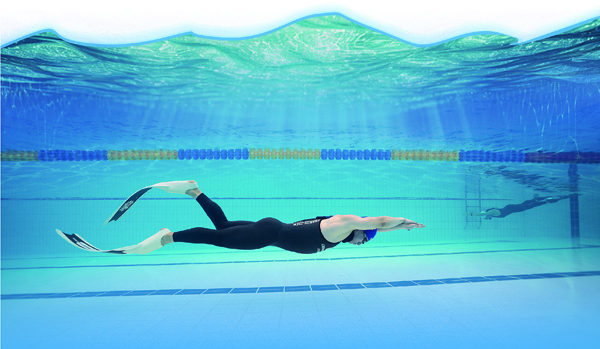'Breath-taking' dedication


Jin Ming, a freediver from Shanghai, set a new world record by swimming 311 meters underwater on a single breath, highlighting his dedication and China's growing prominence in the sport.
How far can someone swim underwater with just a single breath? For Jin Ming from Shanghai, that distance extends to an impressive 311 meters.
The 31-year-old freediver recently achieved a remarkable feat by setting a new world record in DYN (Dynamic Apnea with Fins) at the Ultimate Freediving Challenge in Singapore on May 4. This accomplishment of 311 meters surpassed the previous record of 301 meters, held by French athlete Guillaume Bourdila two years earlier.
In the realm of freediving, divers rely solely on their lung capacity rather than any scuba equipment. Competitive freediving encompasses two primary categories: "depth" competitions, which involve descending as deep as possible in open water on a single breath, and "pool" competitions, which require athletes to hold their breath underwater while remaining stationary or swimming horizontally.
Having competed in both categories, Jin prefers DYN, which falls under the pool category. He considers DYN to be the fastest discipline among all freediving events, providing a sense of water flow and speed.
"It's like piloting a submarine or living out The Fast and the Furious beneath the surface," he said.
In addition to his recent DYN achievement, Jin has a history of making significant strides in the sport. He holds an impressive tally of 46 Chinese national records and 22 Asian records in freediving, establishing himself as the highest-ranking Asian athlete in pool competitions.
"Effort, perseverance, and talent are Jin's defining traits, but it's his relentless effort that truly sets him apart. When given a task that requires 100 percent, he always puts in 120 percent to complete it," said Jin's coach Zhao Lei, also known as Enzo Zhao, founder of One Freedive Club in Beijing.
Unlike many other sports where athletes start training at a young age, freediving is relatively new, especially in China, which is why Jin didn't kick off his career as a professional athlete until his 20s. In 2018, during the fourth year of running his tech startup, he stumbled upon the 1988 French film The Big Blue. At that time, he was struggling with immense work pressures and was captivated by the tranquillity and serenity of the ocean depicted in the film, which prompted him to explore freediving.
"Freediving proved to be an excellent stress reliever," Jin said. "Immersing yourself underwater for extended periods while holding your breath puts you in a state of flow. It also allows you to engage in meditation and relaxation techniques that you can't normally practice on land."
According to Jin, the key to success in freediving lies in one's ability to handle pressure. Among mental, cognitive, and physical skills, freediving requires more mental strength than most other sports. Keeping calm underwater also leads to a lower heart rate and reduces oxygen consumption.
After a year of consistent training, Jin's performance could rival that of professional athletes. So, in 2019, Zhao encouraged him to compete in international events.
But Jin wasn't just competing for himself. "Back then, Japan held most of the freediving records in Asia. At that moment, a spark ignited within me — a sense of national duty, aspiring to propel China to the forefront of Asian freediving," he said.
From late 2019 to mid-2021, Jin dedicated 18 months to achieving this objective, training and participating in competitions, setting three Asian records in the process.
He then aimed even higher: to elevate China to the pinnacle of global freediving.
At the 30th AIDA Pool World Championship in 2023, Jin secured China's first gold medal in the DYN event, positioning China alongside traditional freediving powerhouses like France, Italy, Russia, Poland, and Croatia.
Jin's achievements have left the international freediving community in awe, leading them to coin his training and competitive tactics as the "China Style", diverging from the conventional methods employed by Western athletes.
Explaining his approach, Jin pointed out that since Chinese athletes are not as proficient in breath-holding as some Western counterparts who can endure up to 10 minutes underwater — Jin's national record for Static Apnea (STA) is 8 minutes and 56 seconds — they prioritize speed to cover more distance in less time.
"Our pace surpasses that of most Western freedivers. I maintain an underwater speed of approximately 1.3 meters per second, exceeding the typical one-meter-per-second pace of top athletes from other countries," said Jin.
"Also, our muscle training doesn't emphasize bulking up, but rather focuses on developing lean, highly efficient muscles with strong explosive power and a high lactate threshold for endurance," he explained.
Not being a full-time athlete means Jin must juggle work and freediving training, while also facing the same challenges as professional athletes, including fluctuating performances and self-doubt.




































